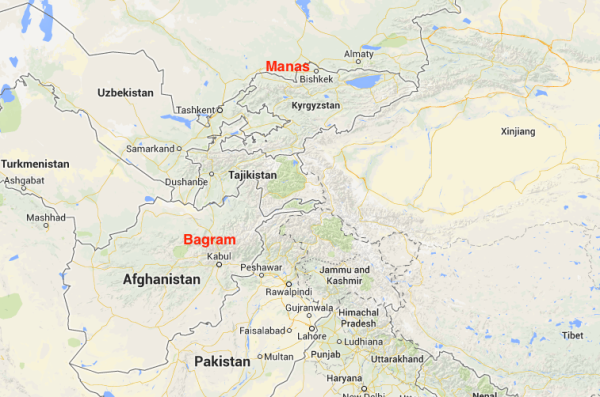A C-17 takes off from the transit center at Manas, Kyrgyzstan, bound for Bagram Air Field, Afghanistan, in 2010.
The Air Force’s top officer is a veteran F-16 pilot who knows a dangerous dive when he sees it. General Mark Welsh has watched the tightening fiscal vise drive the readiness rates of his warplanes down from a goal of 80%, to the mid-50s during a decade of war, to the “high 30s” in recent weeks as mandatory budget cuts begin to bite. “We think,” the Air Force chief of staff said Wednesday, “that’s going to last for awhile.”
Given such intense budgetary pressure, why is the Air Force buying English-language textbooks for every 4th, 5th and 6th grader in Kyrgyzstan?
Probably because it has the money. For most of the past decade, as USAF Capt. Willie Sutton might have said, the military was where the money was. “Today’s military is doing more with more,” Rosa Brooks, an Obama Administration Pentagon appointee from 2009 to 2011, writes in the inaugural issue of Politico Magazine this week. “It sponsors radio and television shows in Afghanistan, operates health clinics in Africa, provides technical assistance to courts and parliaments, engages in cyber-defense, carries out drone strikes in far-flung places, and collects data from our telephone calls and emails.” She quotes retired Army Lieutenant General Dave Barno of the Center for a New American Security that the U.S. military is now “like a super Walmart with everything under one roof.”
Including, apparently, English-language text and workbooks for Kyrgyz kids ages 10 to 13. The Air Force’s 376th Air Expeditionary Wing, based in Kyrgyzstan, is looking to buy the books as part of a “collaborative effort” with the U.S. embassy in Kyrgyzstan, the U.S. Peace Corps, the private Lingua School in the Kyrgyz capital of Bishkek, the Kyrgyz Ministry of Education, the Kyrgyz Academy of Education and the Kyrgyz Academy of Science.
“Supplying the country’s primary schools with sets of learning materials that have a thorough and consistent methodology will provide a dramatic lift to the effectiveness of English language teaching,” the Air Force says, although it doesn’t explain why taking the lead in such an effort is part of the U.S. military’s mission (U.S. students, according to this map, could use such help, too).
Granted, the U.S. military owes Kyrgyzstan thanks for letting it use its Manas airfield outside of Bishkek as a major transit hub for the war in Afghanistan. But the U.S. was paying Kyrgyzstan $60 million annually for the privilege, a lease Bishkek opted not to renew earlier this year when the U.S. declined to pay more. On Thursday, the Kyrgyz government formally notified U.S. Ambassador Pamela Spratlen that the U.S. must vacate the premises by July 11, 2014.
But the school books will remain as a legacy of the U.S. presence in Kyrgyzstan. “The country’s current English language curriculum relies on Soviet methods of teaching and is implemented using inadequate or inconsistent teaching materials and aids at the classroom level,” the Air Force says. “This project will supply all public school grade 4-6 classrooms with sets of up-to-date textbooks and workbooks, which will establish a foundation of continuous learning and development, as well as promoting a better acquisition of the English language.”
There are some particulars in for those seeking to land the contract to produce nearly a half-million books and teachers’ guides:
— The textbooks and materials must teach its users American English, not British English (i.e. color instead of colour; paralyze instead of paralyse). All products must be written completely in American English.
— The textbooks and materials must be adapted from American/European context to a framework that can be comprehended by Kyrgyz children (i.e. Bishkek instead of New York City).
— Much of the geographical, historical, political, cultural, and other miscellaneous references should be changed or adapted to references that children in the Kyrgyz Republic will understand and can relate to.
— All shipping containers should have the phrase “This container contains humanitarian aid from the United States Government to the Ministry of Education” clearly marked on the outside.
— In each textbook, workbook, and teacher manual, an image of crossed Kyrgyz and U.S. flags crossed will be printed on the inside flyleaf page, along with the phrase “Presented on behalf of the Ministry of Education and the Government of the United States” in English, Kyrgyz and Russian.
Like this:
The fate of Manas has been of great interest in Russia. There was a flurry of stories in the Russian media Thursday about Bishkek’s formal delivery of the U.S. deadline to depart, but many in Moscow think it’s all a hoax designed to mask U.S. missile-defense efforts in the region. The U.S. has conducted regular tours at Manas to try to quell such rumors.
The U.S. is moving much of the work it has done at Manas for more than a decade to Romania’s Mihail Kogalniceanu airbase on the Black Sea.
The Romanian base may be three times as far from Afghanistan as Manas, but Bucharest isn’t settling for mere schoolbooks or rent. It’s getting a U.S. missile-defense system.



